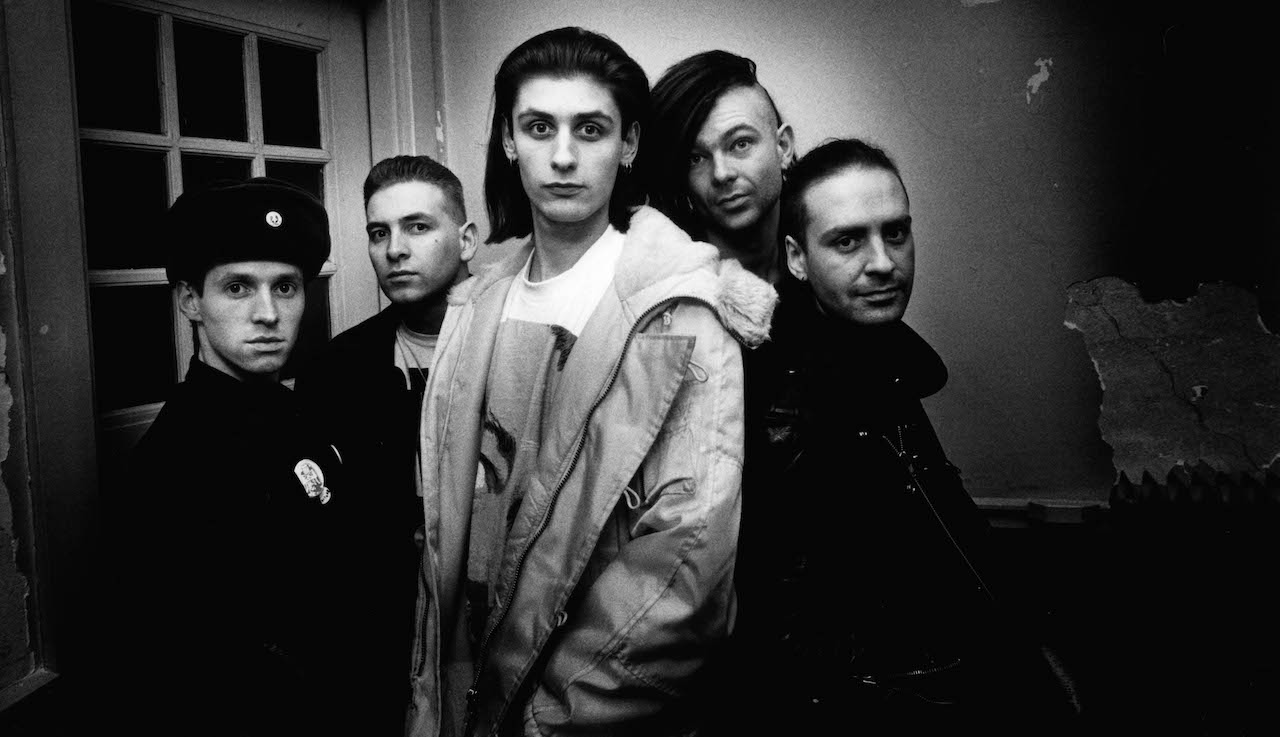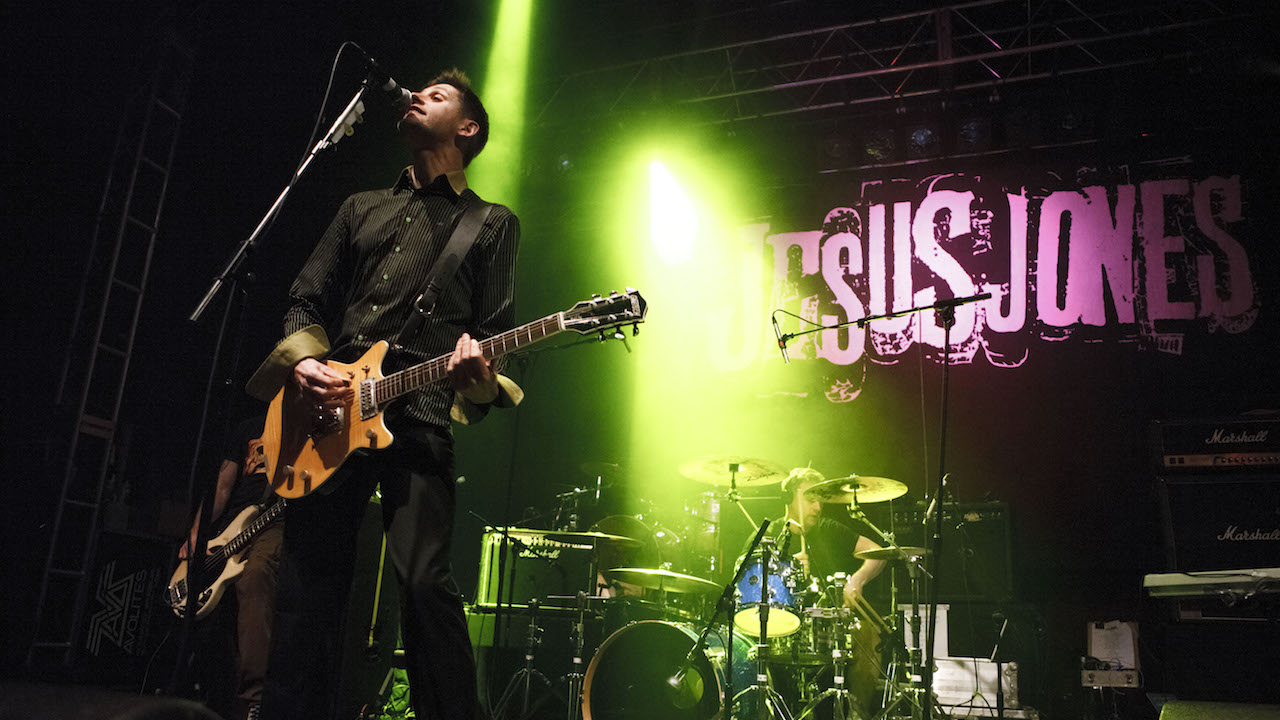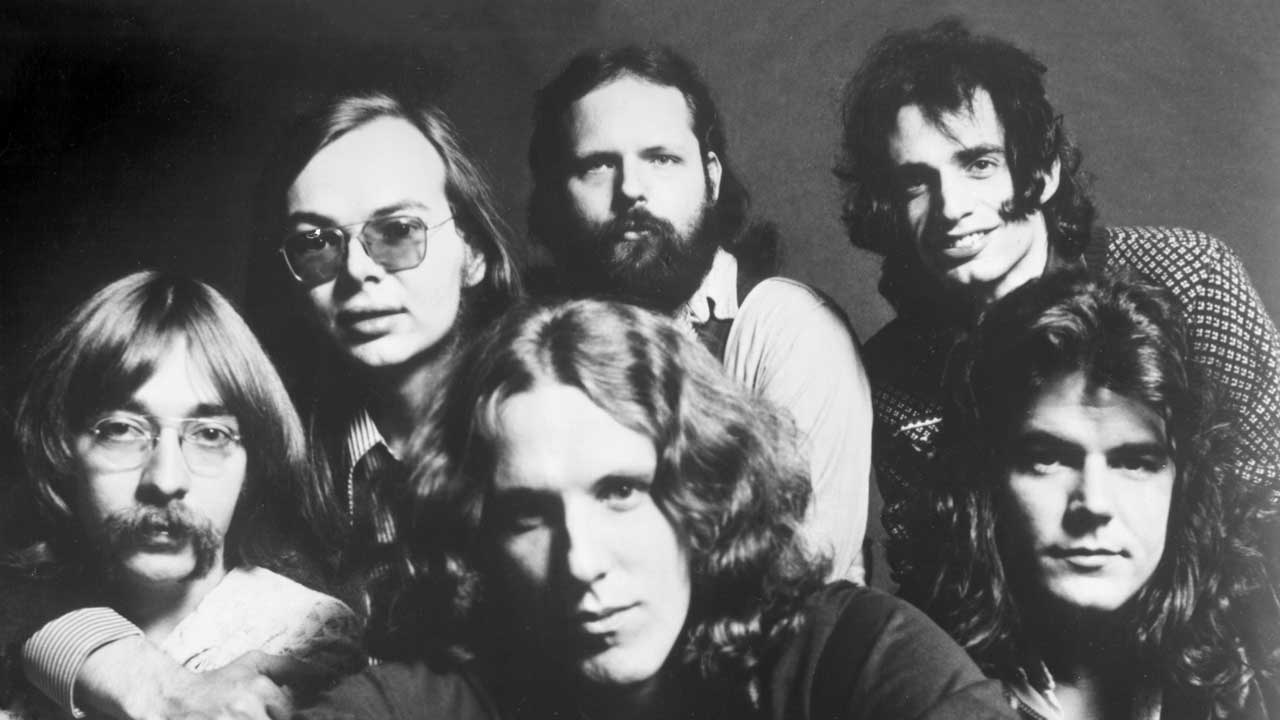The music press killed Jesus Jones. But did the band have the last laugh?
Jesus Jones were built up by the music press – and knocked right back down again when fashions changed. Frontman Mike Edwards on chart success, depression and the rise and demise of that most despised of all music genres: ‘indie dance’.

Select the newsletters you’d like to receive. Then, add your email to sign up.
You are now subscribed
Your newsletter sign-up was successful
Want to add more newsletters?

Every Friday
Louder
Louder’s weekly newsletter is jam-packed with the team’s personal highlights from the last seven days, including features, breaking news, reviews and tons of juicy exclusives from the world of alternative music.

Every Friday
Classic Rock
The Classic Rock newsletter is an essential read for the discerning rock fan. Every week we bring you the news, reviews and the very best features and interviews from our extensive archive. Written by rock fans for rock fans.

Every Friday
Metal Hammer
For the last four decades Metal Hammer has been the world’s greatest metal magazine. Created by metalheads for metalheads, ‘Hammer takes you behind the scenes, closer to the action, and nearer to the bands that you love the most.

Every Friday
Prog
The Prog newsletter brings you the very best of Prog Magazine and our website, every Friday. We'll deliver you the very latest news from the Prog universe, informative features and archive material from Prog’s impressive vault.
“If you call a spade a spade, you call a British music journalist a cunt…” – Mike Edwards, 1997
Once upon a time, as the 80s gave way to the 90s, there came a band called Jesus Jones. They were revolutionaries of sorts and they came to start a fight.
Because Jesus Jones were idealists. They had grown up in Cidertown, Wiltshire (actually Bradford-On-Avon, a small town near Bath), where they had read the music press and, most importantly, believed it.
They especially believed it when the music press said that music should always be changing, setting fire to the past and building something new out of the ruins, that the next big thing should forge fearlessly ahead into a new musical and cultural Year Zero – you know, like wot punk dun – and they set about doing exactly that.
Jesus Jones mashed noise rock with hip-hop and techno, classic songwriting with art-rock, and the timing was perfect. The acid-house revolution had made guitar music look boring-as. Out in the fields and warehouses, hipsters and council estate wide-os were running from the police, gobbling amazing new fast drugs, hugging it up on the dancefloor and shagging on car bonnets to music that actually sounded like The Future.
Look how much fun they were having:

Indie kids, meanwhile, were like:
The latest news, features and interviews direct to your inbox, from the global home of alternative music.

So the music press loved Jesus Jones and clapped-hands-with-glee when Mike said things like: “I think sampling in the 90s could be what the electric guitar was to the 60s. Sooner or later, there'll be a Jimi Hendrix of sampling and I want it to be me."
By the mid-90s, though, the knives were out. In three short years, “Indie-dance” became seen as the last-refuge of the indie-schmindy sell-out. Every two-bit band in Britain had an Andrew Weatherall/Paul Oakenfold remix and the cry of “there’s always been a dance element to our music!” became a running joke.
These numbers tell you all you need to know (but, uh, keep reading, cos I put some effort into this):
In 1989, Jesus Jones’ debut album Liquidiser went to no.31 in the UK album charts.
1991’s Doubt went to no.1, propelled by hits like International Bright Young Thing and Right Here, Right Now.
1993’s Perverse landed at number 6.
Next album Already, didn’t arrive until 1997.
And it went to 161.
The way Mike Edwards saw it, the music press killed his band. Today, they are still touring, have a new album out and the band has the same line-up as they had originally. The NME’s last print edition came out in March 2018.
Have Jesus Jones had the last laugh?

It wasn’t easy being a music obsessive in Bradford-on-Avon in the 80s. “It was difficult,” says Mike. “Now if you want to hear a song, you can go online and hear it in 20 seconds. Back then, I’d have to save up my money, and get on the bus to Bath to buy one record, and then it’d be another hour back home.
“Getting hold of music was really, really difficult. Going to see bands was difficult. The access to music was really tricky and you relied a lot on the music press and the radio in a way that people don’t now – radio just seems like a bit-player.”
As a kid, Edwards went to see “lots of dodgy heavy metal stuff,” he says. “I think I saw a really early incarnation of Whitesnake, when they were halfway between Deep Purple and the Whitesnake that we know. I saw Iron Maiden as well, in their formative years.”
After years in bands, the nascent Jones’s moved to London in 1985, messed around with sampling and took inspiration from new records by The Shamen, The Age of Chance and Pop Will Eat Itself. The NME and Melody Maker were full of the likes of Sonic Youth, Big Black, Public Enemy, Loop and MARRS and Edwards’ interest in art-rock sounds was balanced by an ear for a big chorus.
The music they made was modern and unique without ever sounding difficult or avant garde. “To be honest, that was exactly what I was aiming to do from 1988 onwards,” he says. “That was pretty much our modus operandi. I didn’t want our influences to be blinding obvious, I didn’t want them to over-shadow what we did.
“Back in those days, putting dance beats on rock music wasn’t really done. So it meant that you had a wide open field in front of you to carve your own niche.”
A demo of Info Freako got them signed to Food records – then the home of bands who threatened to go big-time: the pre-fame Blur, Crazyhead and Diesel Park West – and by February 1989 they had a record in the shops.
Mike Edwards would have you believe that the music press were always picking on him, but the truth is they helped make him. Steve Lamacq reviewed Info Freako as “a mix of maniacal guitars and twisted samples that puts them somewhere between Crazyhead and Tackhead… an example of how bands can take Pop Will Eat Itself's techno-rock one step further.”
Elsewhere in the NME: “Jesus Jones are the legendary synthesis between Beatle-pop, early 80s gurly pop and goddamn awful punk rock. Their use of hip-hop technology is unsurpassed. If Public Enemy worked with the young Phil Spector they might sound this good - but I doubt it.”
Steven Wells compared Info Freako to the Beatles’ Helter Skelter, Holiday in Cambodia by the Dead Kennedys, Upside Down by the Mary Chain and hearing Public Enemy for the first time. It was, he said, “Where pop meets hysteria, froths at the mouth and frays at edges but never breaks into sweat. Imagine a Cuban-heeled boot stamping on a fuzzbox pedal forever.” And he meant it in a good way.
Sounds, meanwhile, called Info Freako “the most outstanding and original debut of the year.”
Even today, almost 20 years later, Info Freako sounds oddly futuristic, or at least modern: 2 minutes 50 seconds of sirens, skittering beats, lurching rhythms and guitars that sound like they’re dialled in via 56 kbps modem. It’s Skrillex meets The Clash – apparently featuring samples of Hendrix, Faith No More and Run DMC, though you’d be hard pressed to spot them – a panicked and paranoid rant with lyrics that presaged the multi-screen Twitterverse we live in now:
I never let a headline by
'Cause every one will catch my eye
And though it's tough to keep alert
You never know what could hurt me
…Info Freako,
There is no end to what I want to know
We’re all Info Freakos now. “Absolutely,” says Edwards. “And this was before the Information Age. It’s interesting the paranoia in that song. There’s quite a lot of dark stuff on [debut album] Liquidiser, a dark undercurrent to a lot of the songs. Info Freako is not a person in a happy place, I’d say.”
By his own admission, Edwards wasn’t either. Later, in a book he wrote called Death Threats from an 8 year old in the Seychelles (so named because he really did get death threats from an eight year-old after slagging off New Kids On The Block), he claimed that sour grapes from the music press and envy over their success Stateside, meant that “from the summer of ’89 onwards I felt that I was being trailed by an army of pygmies shooting darts at me”.
In the book he writes about an episode in San Francisco that crystallised his new-found fame: A “staggering drunk with a camera” wobbled towards him, shouting, "Hey asshole! Lemme take your picture!"
"He summed it up for me," he writes, "'I hate you, but wait til my friends see I met a famous guy!'”
Edwards enforced a ‘no drink or drugs onstage’ rule – “playing music that was driven by the mathematically-precise rhythms of sequencers meant that any deviation in timings was glaring obvious” – but talking about it saw him ridiculed in the press “as the Cliff Richard of indie”.
"I dislike excess,” he said. “it's the worst form of conformity there is, a cartoon idea of what rock stars should be. I loathe and detest rock-star bullshit, because it doesn't achieve anything." (Not that they didn’t indulge a bit. In Brazil, cocaine was $4 a gram and offstage “the entire gamut of street drugs were sampled,” he wrote. “We were just doing the things that most people our age were doing… In America, Japan, Australia, women would throw themselves at us and they wouldn’t always be thrown back.”)
In 1990, single International Bright Young Thing went to no.7 in the UK singles chart. Sounds commented, “If selling out was an Olympic event, Jesus Jones would be gold medalists and world record holders.”
The following year, Edwards suffered his first bout of depression. He told Record Mirror: "The reason our second LP is called 'Doubt' is partly because when our first LP Liquidiser was released, I was doing my first heavy duty interviews, with people questioning me about everything the band and I had done and were doing.
“After my initial spell of super confidence which followed the album first coming out, it started to turn into self-examination, doubt and a lack of self-confidence. I looked around at what we'd done and thought 'Have we just fooled everybody? Are we really that good?' I mean, I've always thought we were good and everything, but all that constant self-searching can really knock you back.”
Astonishing then, that the band scored a US no.2 with Right Here, Right Now, a song brimming with optimism.
“The lyrics are obviously about the Berlin wall coming down,” says Edwards. “Simple Minds had done a cover of [Prince’s] Sign O’ The Times, and I remember sharing their enthusiasm for the song but not necessarily their version, but also thinking that Sign O’ The Times is a very down song, it has a very bleak view of the times. I was thinking, ‘Hang on, the Berlin wall is coming down - we never thought that was going to happen’.” He set out to revamp Sign O’ The Times for the, like, actual times.
“The bassline and drums on my demo version were entirely provided by that Sign O’ The Times loop. I wanted a real kind of Velvet Underground guitar style and I had a two bar loop from Sign O’ The Times that I played over.”
You can hear it, too. The Martin Philips 12" remix (above) features a bass part that is a very close relation to the one on the Prince record. “We used Martin Philips because he’d worked with the Beloved and we loved what he’d done,” he says. “But on one of their singles he’d used a sample without permission, as you did in those days, and gotten absolutely hammered for it. I mean, financially. So when I came along with this song with Sign O’ The Times running all the way through it, he said, ‘I think we’ll change that first of all.’
The finished track, Right Here, Right Now, was the most played song on US college radio that year.
But success has its downside and by ’93, the knives were well and truly out for Jesus Jones. Melody Maker: “The merger of techno and rock Jesus Jones are wreaking here is Blur meets The Shamen, rather than Prodigy fistfucks Young Gods.”
NME: “There is something fundamentally wrong with Jesus Jones: they have no sense of the ridiculous. They are loathed by every man, woman and child in Christendom, because they are a plasticine pop group who refuse to accept the fact that they are the stuff of three-minute-flavoured pop sweets. They are The Monkees who want to be Emerson, Lake And Palmer; five Mike Nesmiths.”

Following album Perverse was peak Jesus Jones, says Edwards – the best thing they ever did. “The ideas were developed to their utmost point,” he says. “The things I’d been trying to do, I did best on that album. There’s some great songs on there, a number of our best. The sound quality - it had a fantastic production job done on it by Warne Livesy. So creatively, that’s the high point. Not commercially, although it didn’t do badly, but that’s the one I’m most proud of it.
“Particularly at that time – everyone was going back to the early 70s [for inspiration] and I felt there was still quite a lot to be said about the early 90s. It’s called Perverse because I was swimming against the tide. Week in, week out, I was hearing sounds that I’d never heard before and yet everything around us was re-treds of Black Sabbath songs. And that seemed kind of depressing when just a few years before we’d seen a new way forward - and retreated from that.”
1993 was the height of grunge. A new revolution had come along, hiked its skirts and turned the heads of the music press. It was crazy, the way Edwards saw it: the people who had lauded his great leaps forward were now “incessantly eulogising offensively plagiaristic bands” while he was on the dance floor hearing sounds that were “completely and deliberately ignored by the medium I’d always expected to keep me informed”.
This is how much Kurt Cobain cared about that:

A Reading Festival appearance was slagged by the NME, even though the writer was apparently 35 miles from the site at the time they played. Edwards later got wind of a rumour that NME editor Steve Sutherland was allegedly insisting that the paper’s sponsorship of Glastonbury came with one condition - that Jesus Jones didn’t appear on the bill. Afterwards he refused to have anything to do with the mag.
They struggled to write for the fourth album, Already. When it came out in 1997, it went 161 in the charts. Perverse had gone to no.6. What had changed?
“We felt at the time that the music press could actually get away with ignoring us,” he says. “Whereas in 93 they couldn’t - if we had an album out and they didn’t report on it, they would have looked daft. I remember the press schedule for that album: we were lucky to get the gardening pages of the Sheffield Gazette. We had virtually no music press whatsoever. We had the record company going out to the likes of the NME and saying, ‘What do you reckon?’ and they just got a flat ’no’. They just wouldn’t even mention it. No one knew we had an album out. The reasons why they felt they could ignore us was there had been, what, three years between albums. That album, under the record company’s direction, was made and then remade, which I think was a big mistake. It took so long that by the time we came out we seemed to be in a different place from the rest of music.”
Between 1994 and 97, though, music moved quickly. Albums released in that time include Green Day’s Dookie, The Offspring’s Smash, Parklife by Blur, Weezer’s ‘blue’ album, Machine Head’s Burn My Eyes, Jeff Buckley’s Grace, Underworld’s Dubnobasswithmyheadman, Crooked Rain, Crooked Rain by Pavement, Beck’s Mellow Gold, the Fugees’ Blunted On Reality, Superunknown by Soundgarden, Hole’s Live Through This, Portishead’s Dummy, Massive Attack’s Protection, Suede’s Dog Man Star, the Manics’ The Holy Bible.
And that was just 1994.
Between 1994-97, label mates Blur had an entire career, going from from Britpop chart toppers to burnt out drug-and-booze addled post-grunge alt.rockers. 1997 saw the release of OK Computer by Radiohead, The Prodigy’s The Fat Of The Land and Vanishing Point by Primal Scream. Music moved faster then. There are bands around today who’ve been around made 5 or 6 years and still considered a new band… (“Yeah,” he says, “that’s strange isn’t it? You’d think there would be a faster turnaround now.”)
So how does he feel about the closure of the NME? “Totally ambivalent,” he says. “I haven’t really paid it any attention for years. In a way, curated playlists have replaced it. I don’t find it interesting to read about bands [Yeah. He said that. THANKS A FUCKING LOT, MIKE]. I find it much more interesting to listen to the music. You used the NME to point you in the direction of new bands. But I haven’t found the need for that because I can find new bands my own. So it doesn’t really matter to me.”
Is there anything that he could have done that would have changed their fortunes? Could Jesus Jones have ‘gone Britpop’? “Yeah, I think that would have been the smarter move to have made,” he says. “No guarantees of course, and we could have felt and looked awful by doing that, but it would have been the career thing to do.
“It worked for some but i wasn’t interested. It’s not just about selling records,” says the guy once accused of being an Olympian sell-out.
Right. What’s it about? “Enjoying the records that you make. Being proud of them.”
So if courting popularity wasn’t the right move, could he have gone the other way: become more experimental, artier – gone for credibility? (For some reason, I use the example of Tricky whose music, after the success of Maxinquaye, seemed to get more bleak and impenetrable. By ignoring the mainstream and refusing to chase success, he still has credibility now.) Did Jesus Jones take it far enough?
“I don’t think it was an avenue that was open to us,” he says. “By the time we’d had the level of success we had, we were seen as an out and out pop act, even if that’s not actually accurate. If Justin Bieber made a death metal album, I still don’t think anyone’s going to take him seriously.”
I don’t think you were quite Justin Bieber. “No. That was possibly the worst comparison I could have made,” he says.
You can see what he’s getting at, though. When you’re a radio-friendly unit shifter who’s been to number 1 and broken the States, the record company want their pound of flesh. “In the mid 90s there wasn’t much that inspired me,” he says, “but I was contractually obliged to deliver an album once a year. Now I do it because I want to.”

Today, Jesus Jones have a new album out and are gigging and playing festivals. The band is unchanged from its original line-up – which totally undermines any image of Edwards as some domineering taskmaster – and the album, Passages, sounds unmistakably like Jesus Jones, from the effects on Edwards‘ voice to the digital splicing and dicing of the music. What sounded revolutionary in 1989, though, sounds much more conventional today. Has the tech revolution gone as far as it can?
Edwards doesn’t think so. “I listen to a lot of modern electronic music and it keeps moving on,” he says. “As a movement, as a genre, Trap is something that’s been a big step forward. It clearly has its roots in late 80s hip-hop but, nonetheless, it has its own distinct style and musical traits, although they may be going a little brown and curly at the edges now. But I keep hearing electronic music that is astonishing and thinking, ‘How the hell did they do that?’
“I also think that bass, which to me is always the foundation of music, is getting bassier with every decade that goes past. People can now sort of blot out an entire room with bass – when you look at drum’n’bass from 20 years ago, what we thought then was massively bassy just doesn’t compete at all. So I think sonically, creatively, there’s a lot of adventure time left in modern digital music.”
He’s not as optimistic about the rest of the world though. Passages’ opening track Where Are All The Dreams? talks about Turkeys voting for Christmas and features the line ‘I feel like the best is behind us/It’s near the end and I still need to give a damn’. What turkeys is he talking about there?
“People who voted for Brexit,” he says bluntly. “That song is actually the polar opposite of Right Here, Right Now. While it captured the giddy optimism of the Berlin wall coming down – what a time to be alive – we’ve moved to the other end of the spectrum. I mean: Where Are All The Dreams? The point is in the title, really.”
Passages is out now. Buy it on Amazon. See Jesus Jones play live this summer.

Scott is the Content Director of Music at Future plc, responsible for the editorial strategy of online and print brands like Louder, Classic Rock, Metal Hammer, Prog, Guitarist, Guitar World, Guitar Player, Total Guitar etc. He was Editor in Chief of Classic Rock magazine for 10 years and Editor of Total Guitar for 4 years and has contributed to The Big Issue, Esquire and more. Scott wrote chapters for two of legendary sleeve designer Storm Thorgerson's books (For The Love Of Vinyl, 2009, and Gathering Storm, 2015). He regularly appears on Classic Rock’s podcast, The 20 Million Club, and was the writer/researcher on 2017’s Mick Ronson documentary Beside Bowie.
